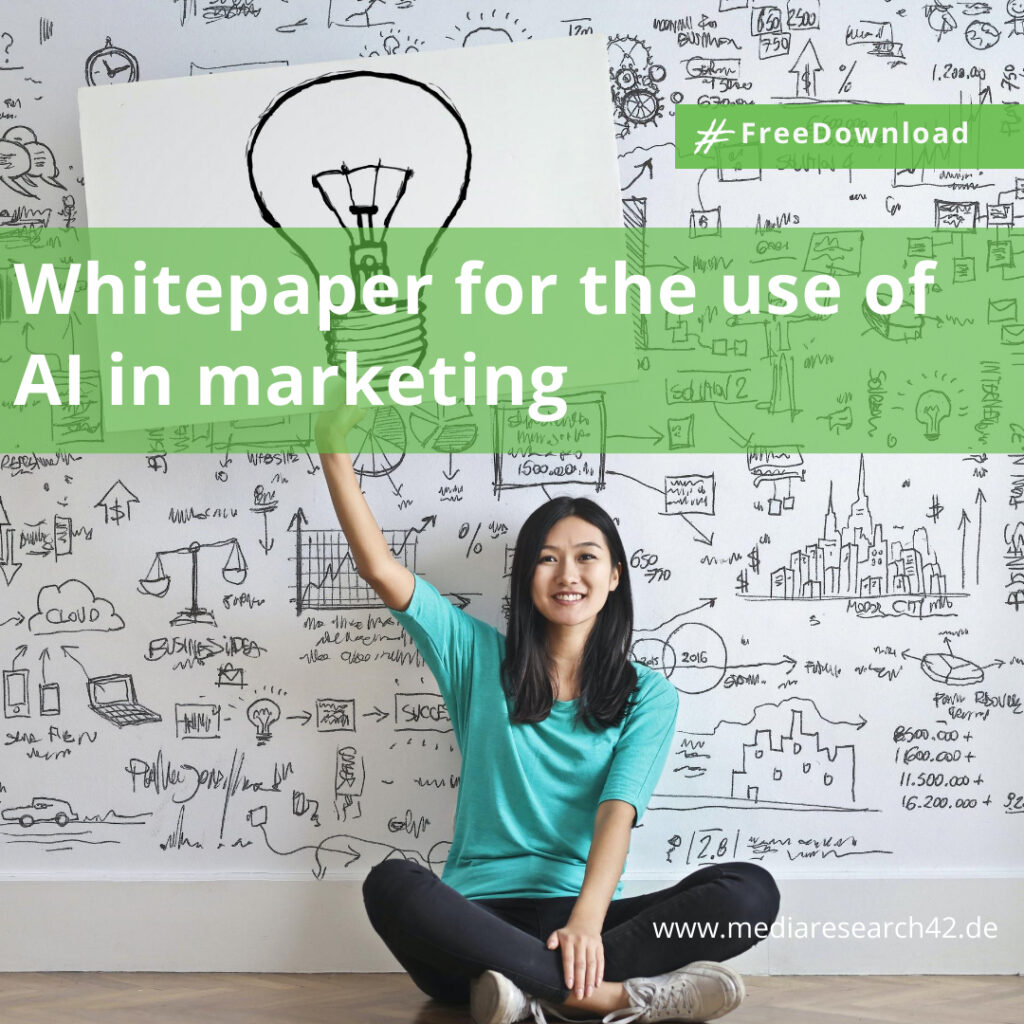
The Statista AI Compass is a starting point for the use of AI in marketing
With the brand new Statista AI Compass, I have once again written an entire e-book to make the work of content marketing decision-makers easier. This blog post provides an excerpt from it. The 30-page e-book can now be downloaded free of charge as a PDF from the Statista website. An German version, the “Statista KI-Compass” is available here.
The topic of artificial intelligence (AI) is polarizing. Since the introduction of ChatGPT at the end of 2022 at the latest, AI in the marketing context has made it out of the niche and into the everyday lives of marketing professionals – both in B2B and B2C. Many marketers use AI tools to analyze customer data, establish correlations and predict purchasing behavior as accurately as possible. The speed at which these are being developed is increasing exponentially. The trend towards more AI in marketing has therefore increased significantly in the recent past.
This is because the opportunities offered by the use of AI in marketing alone are enormous. Use cases include personalized emails, for example. AI tools are becoming increasingly important, especially for content creation and customer contact, and are also revolutionizing content marketing. If used correctly, AI promises to achieve more results with less time and resources and to reach a new level of productivity. McKinsey estimates that generative AI can improve the productivity of marketing functions by between five and 15 percent of total marketing expenditure (see McKinsey 2023, p. 18).
But will a lack of ideas, writer’s block, inappropriate customer approaches and too many content channels for too few resources really be a thing of the past thanks to AI? What does the application of AI in marketing actually look like? Where is its use worthwhile and how is AI being used by other companies today?
What you can expect: Orientation and concrete implementation tips for the use of AI tools in content marketing for B2B and B2C
Our aim and concern with this Compass format is to provide you with compact, data-driven facts on a key topic and to give you guidance on the use of AI in your company based on the most important AI studies. From here, the Statista AI Compass provides you – as usual in the Statista Compass series – with concrete implementation tips (keyword “prompts”) and further learning opportunities, including tool tips for SMEs, so that you can support your (content) marketing with AI in the best possible way. This allows you to develop your own AI strategy and get straight into implementation.
Six fields of application and use cases for AI in marketing
AI provides you with marketing support for both internal and external tasks, e.g. for the
- Efficient and effective content creation
- Personalized emails and newsletters
- Forecasting customer lifetime value (CLV)
- Sentiment analyses
- Optimized data management
- Search engine optimization (SEO)
The most common use cases of AI for marketing professionals can be divided into the areas of idea generation, planning, content production, publication, analysis and optimization. The Statista AI Compass provides concrete assistance on how AI helps, for example, to develop marketing campaign ideas, understand the search intent of the target group and create keywords including SEO headings, title tags and meta descriptions.
Content production becomes more efficient because you don’t have to start from scratch. AI helps to write initial marketing texts, convert content into formats, test social media posts, ads and landing pages. And what is particularly exciting for me as a success meter is the ability of AI to support the analysis of data.
Prompts and tool tips for AI in marketing
Once the challenges of using AI in marketing described in the AI Compass have been overcome, a good deal of knowledge transfer and pragmatic trial and error is required to overcome the uncertainties surrounding the use and handling of AI, especially generative AI such as ChatGPT & Co. This chapter therefore deals with practical tips for getting started with the topic – and there may also be one or two tips for those who already use generative AI in their day-to-day marketing operations.
And if your fingers are itching to let ChatGPT or Google Gimini help you with one or two marketing tasks, the Statista AI Compass describes eight useful ChatGPT prompts for typical marketing tasks to make your content marketing even more efficient with generative AI. A little tip for you, for example, is the ChatGPT Cheat Sheet, a cheat sheet for even more creative and better work with ChatGPT. It was created by the Hamburg-based innovation consultancy Facts and Stories – visually appealing and practical, right? Simply download the cheat sheet, print it out or install it as your desktop background. You can download the ChatGPT Cheat Sheet at: www.factsandstories.de/chatgpt
How to successfully introduce AI in your marketing team
After the tangible prompting tips and AI tool recommendations from my favorite experts, the Statista AI Compass naturally includes the next steps, i.e. a short guide on what to consider when introducing AI tools in marketing. And finally, I take a strategic look at China, among other things. AI expert Prof. Dr. Claudia Bünte has written many exciting articles and books on this subject, which I will summarize. And hopefully make you want to take advantage of the many further offers, seminars, newsletters and podcasts on the subject of AI, which are compiled and linked in the Statista AI Compass.
As always, I wish you many enlightening insights and practical inspiration paired with a great boost of motivation to put many things into practice in a very pragmatic way. Take the plunge and get started – and if you have any questions, let’s talk on LinkedIn or by email!
Download now: Click here for the free download of the Statista AI Compass
Best wishes and good luck,
Dr. Sandra Gärtner
